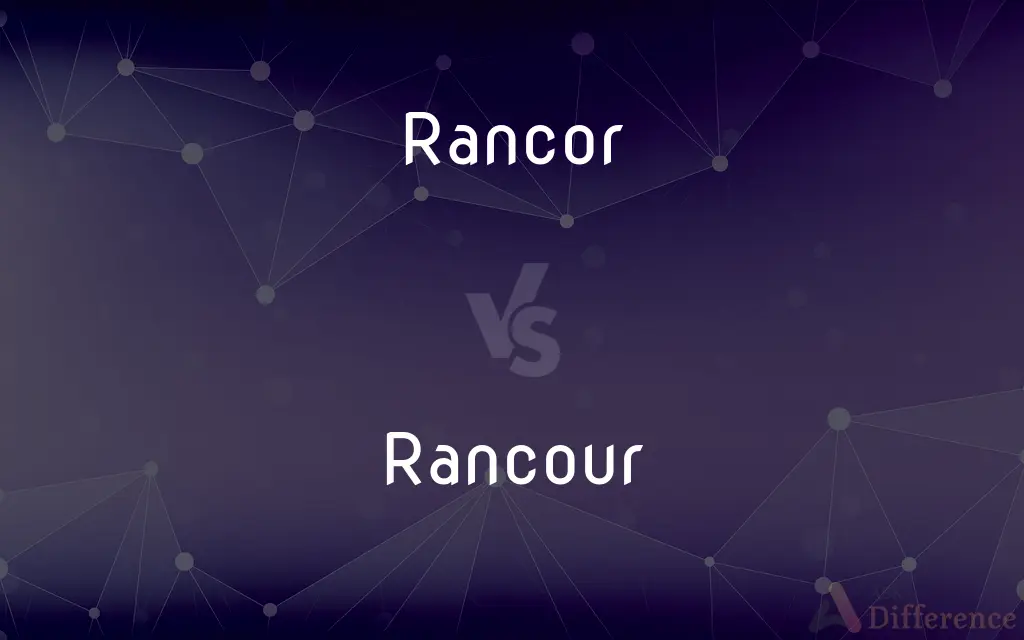Rancor vs. Rancour — What's the Difference?
By Fiza Rafique & Maham Liaqat — Updated on April 6, 2024
Rancor is the American English spelling for deep-seated bitterness, while Rancour is its British counterpart, both indicating intense resentment.

Difference Between Rancor and Rancour
Table of Contents
ADVERTISEMENT
Key Differences
Rancor refers to a deep, long-standing bitterness or resentment that one may hold, often resulting from past grievances or injustices. It is a term that conveys the intensity and depth of negative feelings. On the other hand, Rancour is simply the British English spelling of the same word, carrying the same meanings and connotations. The difference lies solely in the spelling, reflective of the linguistic variations between American and British English.
While rancor is used in contexts within American publications, literature, and dialogue, emphasizing American English conventions, rancour is preferred in British contexts, aligning with the spelling and usage standards of British English. This distinction is similar to other spelling differences between the two versions of English, such as "color" vs. "colour" or "honor" vs. "honour".
In terms of pronunciation, both terms are pronounced similarly in their respective dialects, with minor variations in accent and emphasis reflecting the linguistic nuances of American and British English. However, the core pronunciation remains largely the same, emphasizing the universal nature of the emotion they describe.
The emotional context of rancor/rancour transcends the slight spelling difference, highlighting a universal human experience. Regardless of the spelling, the term signifies a potent and often harmful emotional state, underscoring the psychological impact of holding onto deep-seated resentment.
Understanding the distinction between rancor and rancour is essential for writers, editors, and anyone working with English texts, ensuring that language usage aligns with the intended audience's standards. It highlights the importance of attention to detail in language and the subtle differences that define the rich tapestry of English spelling variations.
ADVERTISEMENT
Comparison Chart
Spelling
Rancor
Rancour
Usage
American English
British English
Pronunciation
Similar, with minor variations based on American accent
Similar, with minor variations based on British accent
Context
Used in American publications and dialogues
Used in British publications and dialogues
Emotional Context
Deep-seated resentment or bitterness
Deep-seated resentment or bitterness
Compare with Definitions
Rancor
Long-lasting animosity or ill will.
The rancor between the two families had lasted for generations.
Rancour
Long-standing animosity or ill will.
The strike caused rancour that affected the company for years.
Rancor
A feeling of hatred or spite.
His speech was full of rancor towards his opponents.
Rancour
A feeling of deep anger or spite.
There was a hint of rancour in his polite words.
Rancor
Bitter, rankling resentment.
She couldn’t let go of the rancor she felt for her betrayal.
Rancour
Persistent resentment.
Rancour against the unjust system grew among the populace.
Rancor
Deep-seated resentment or bitterness.
After the divorce, his heart was filled with rancor.
Rancour
Deep-seated resentment or bitterness.
Her diary revealed years of rancour towards her colleague.
Rancor
Deeply held bitterness.
The rancor in his voice was unmistakable.
Rancour
Enduring bitterness or spitefulness.
Despite reconciliation efforts, the rancour remained.
Rancor
Bitter, long-lasting resentment; deep-seated ill will
He was filled with rancor after losing his job.
Rancour
Variant of rancor.
Rancor
(American spelling) A feeling of long-lasting ire for another, sometimes to the point of hatred, over a perceived wrongdoing; bitterness.
I could almost see the rancor in his eyes when he challenged me to a fight.
Rancour
Alternative spelling of rancor
Rancor
(rare) Rancidity, rankness.
Rancour
A feeling of deep and bitter anger and ill-will
Rancor
The deepest malignity or spite; deep-seated enmity or malice; inveterate hatred.
It would not be easy to conceive the passion, rancor, and malice of their tongues and hearts.
Rancor will out; proud prelate, in thy faceI see thy fury.
Rancor is that degree of malice which preys upon the possessor.
Rancor
A feeling of deep and bitter anger and ill-will
Common Curiosities
What does rancour mean?
Rancour means the same as rancor, indicating deep-seated bitterness or resentment, but is used in British English.
Why are there two spellings for rancor/rancour?
The difference in spelling reflects the linguistic variations between American English (rancor) and British English (rancour).
Are rancor and rancour pronounced the same way?
Yes, they are pronounced similarly, with minor variations reflecting American and British accents.
Are there synonyms for rancor/rancour?
Yes, synonyms include bitterness, resentment, animosity, ill will, and spite.
How can one overcome feelings of rancor/rancour?
Overcoming rancor/rancour often involves forgiveness, understanding, and addressing the root causes of the bitterness.
Is rancor/rancour always negative?
While primarily seen as negative due to its association with bitterness and resentment, it can sometimes motivate individuals to address and resolve underlying issues.
How does rancor/rancour affect mental health?
Prolonged feelings of rancor/rancour can negatively affect mental health, leading to stress, depression, and anxiety.
What is rancor?
Rancor is a feeling of deep, bitter resentment or ill will, often persisting for a long time.
Is it important to address feelings of rancor/rancour?
Yes, addressing these feelings is crucial for emotional well-being and maintaining healthy relationships.
Can the feelings of rancor/rancour affect personal relationships?
Yes, feelings of rancor or rancour can significantly impact and damage personal relationships.
Do rancor and rancour have the same emotional impact?
Yes, regardless of spelling, both convey the same level of emotional intensity and impact.
Is rancor more commonly used in American literature?
Yes, rancor is more commonly used in American literature, reflecting American English spelling conventions.
Does literature play a role in understanding rancor/rancour?
Literature can offer deep insights into the nature of rancor/rancour and its effects on human relationships and behavior.
In what contexts can rancor/rancour be used?
Rancor/rancour can be used in literary, psychological, and everyday contexts to describe deep-seated resentment.
Can rancor/rancour lead to physical health issues?
Yes, chronic emotional stress, including rancor/rancour, can lead to physical health issues.
Share Your Discovery

Previous Comparison
Fare vs. Fee
Next Comparison
Critique vs. CriticismAuthor Spotlight
Written by
Fiza RafiqueFiza Rafique is a skilled content writer at AskDifference.com, where she meticulously refines and enhances written pieces. Drawing from her vast editorial expertise, Fiza ensures clarity, accuracy, and precision in every article. Passionate about language, she continually seeks to elevate the quality of content for readers worldwide.
Co-written by
Maham Liaqat















































